A legacy of service: three decades of advancing Māori health
Our distinguished alumna Awerangi Tamihere’s journey is of endurance, innovation, and profound commitment to Māori health. It was in 1997 that Massey University last showcased Awerangi in our Alumni magazine, capturing a moment in her outstanding career. Since those pages were printed and shared, the chapters of Awerangi’s life have been filled with continuous growth, learning, and accomplishment. We are thrilled to reconnect with her and to share with you the strides she has made and the impact she has created in the years that have passed.
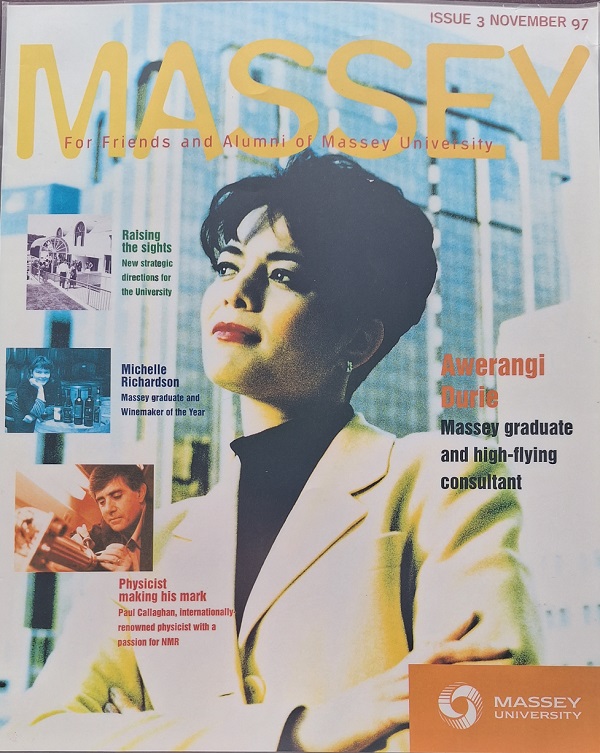
Awerangi in our Alumni magazine, 1997
Mrs Awerangi Tamihere, Ngāti Kauwhata, Rangitāne, Ngāti Porou, Rongowhakaata, Kāi Tahu, is the Chief Operating Officer for Te Whānau o Waipareira and the Whānau Ora Commissioning Agency. Before taking on her current role, Awerangi was the Director of Wai-Atamai with Te Whānau o Waipareira for the last five years. In addition to her central duties, Awerangi has recently been appointed as a Komiti Member and Deputy Chair of Ngā Kaitiaki o Ngāti Kauwhata in October. Her extensive portfolio, which includes being Co-Chair of the Auckland Regional Skills Group, Deputy Chair of Te Putea Whakatupu Trust, and a Director on the Board of the Māori Health Authority, Te Aka Whaiora, reflects her multifaceted leadership skills and her dedication to fostering a sustainable and resilient Māori community.
Embarking on a path of influence
Awerangi’s quest began at Massey University in 1984 when she pursued a Bachelor of Education – a pursuit that would later prove pivotal in her multifaceted approach to Māori health.
Her initial motivations in Māori Health were as noble as they were personal. “Originally trained as a Speech Language Therapist, the second Māori in New Zealand to be trained as such, I found myself working in the health sector before being fast-tracked into a national health management programme,” she recalls. This crucial pivot in her career trajectory was motivated by an overarching goal: to accelerate the advancement of health professionals into management roles, thereby fostering a generation of leaders equipped to champion health reforms from within the system.
Adding to her diverse experiences, she also contributed as a part-time lecturer at Massey’s Auckland campus for the Bachelor of Speech and Language Pathology, specifically teaching the Treaty of Waitangi paper for three years in the early 2000s.
Awerangi’s Massey education expanded her perspective on health, emphasising the interconnectedness of various societal sectors in nurturing the wellbeing of Māori. “My education helped to set a broader framework for understanding how different sectors contribute to tackling complex problems,” she says.
With a vision that education and health are inseparable strands of the same cord, she ventured into health policy, reforms, and management sectors, bringing with her a wealth of indigenous knowledge and a determination to see Māori thrive. As she steered her career towards health reform, Awerangi became a pivotal figure in policy development at the Ministry of Health (MOH). She later assumed influential roles in the Department of the Prime Minister and Cabinet (DPMC).
“My work in policy at MOH, health reforms at DPMC, and then in management roles in regional and local entities supporting health reform rollout... formed a strong foundation,” Awerangi reflects.
Awerangi expanded her governance experience in her late twenties by serving on boards such as the Optometrists and Dispensing Opticians Board and as a Board Director for the Ministry of Special Education. These roles were instrumental in shaping her governance work today, integrating social determinants to achieve wellbeing.
Cultivating growth and innovation
In her esteemed capacity as the Chief Operating Officer for both Te Whānau o Waipareira and the Whānau Ora Commissioning Agency, Awerangi applied the comprehensive knowledge and skills she garnered at Massey to spearhead health reform and operational model design. Her work transcended traditional boundaries, focusing on integrated business models that aimed at improving the overall wellbeing of Māori across sectors.
Her philosophy on health reform is encapsulated in her innovative approach to operational design, “Ensuring traditional models of procurement move to commissioning for outcomes so we can evidence that change that matters for health gains rather than a report based purely on inputs, activities, and outputs.” This, according to Awerangi, brings “a much sharper focus on accountability and transparency to achieve and demonstrate Māori health outcomes.”
As a visionary in Māori health advancements, Awerangi underscores the significance of university education in two principal pathways: becoming a health specialist to address New Zealand’s shortage in this field or studying broader disciplines to understand and impact the social determinants of health for Māori.
Cultural legacy and community empowerment
Reflecting on her 35 years of dedication, Awerangi articulates her work's profound importance: "Developing new models of service delivery focused on the aspirations and priorities of the whānau for wellbeing has been at the forefront of my role.” She speaks with pride about the systems approach to wellbeing she has championed, mainly through the Whānau Ora Commissioning Agency, which oversees a network of partners dedicated to achieving sustainable health gains that contribute significantly to the broader spectrum of whānau wellbeing.
The expansion of Te Whānau o Waipareira under her stewardship is a narrative of strategic evolution and impact. She considers her most impactful decision to be the shift from input-focused reporting to outcome-based reporting – a move that instilled a culture of accountability in the communities they serve.
Her strategies for the success of the Whānau Ora Commissioning for Outcomes Model are manifold, ranging from prioritising long-term value creation and prevention to embracing co-production and innovation. These approaches have fostered an environment where Whānau Ora partners and whānau co-create programmes that meet community needs.
The Whānau Ora 2022/23 Annual Report and the research report “E Tipu E Rea Ngā Tini Whetū” stand as testaments to the positive impacts of these strategies, showcasing success stories and evidencing the reduction of child poverty as a result of these concerted efforts.
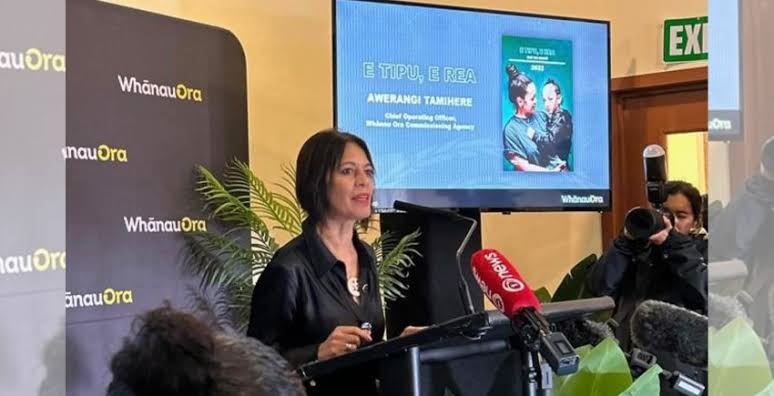
Launching Whānau Ora Reducing Child Poverty Report, Ruapotaka Marae, East Auckland, 2022.
Global advocacy and leadership in crisis
Awerangi’s leadership extended to the global stage in 2022 when she was appointed as a Global Commissioner on the Global Values Commission. Here, she advocates for transparency and accountability in applying value factors within organisations, contributing Māori perspectives to a global dialogue.
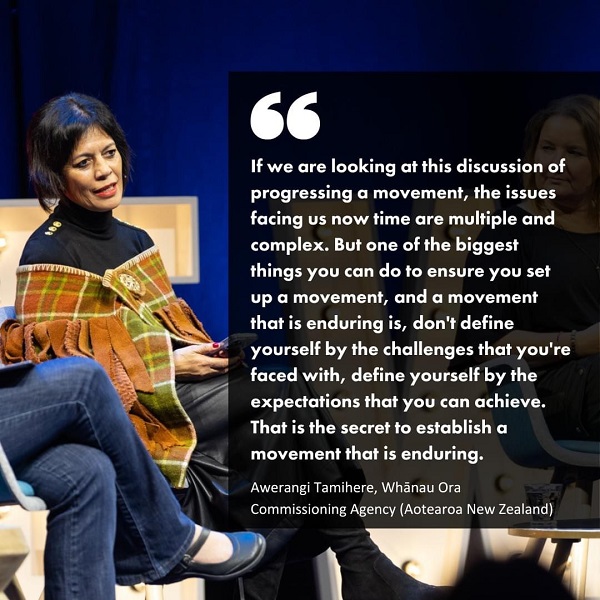
Speaking at World Social Enterprise Forum, Amsterdam, October 2023
Her leadership prowess was particularly evident during the Covid-19 pandemic. Leading an 80-member team composed of vaccinators, nurses, and support staff, she orchestrated efforts to bolster the vaccination drive across the Northland region, showcasing her capacity to mobilise and inspire in times of crisis.
Her long-standing membership with the Māori Women’s Welfare League has also significantly influenced her work in health reform. “My Great-Grandmother, Kahurautete Durie, was a lifelong member of the Māori Women’s Welfare League. My mother, Lady Arohia Durie, was a member of the League for many years. I also recall attending the national Māori Women's Welfare League hui as a young teenager with my father, Sir Mason Durie.” In addition, she is a member of the Māori Women's Welfare League (Ngākau Atawhai Branch, West Auckland), further reinforcing her connection and commitment to the organisation.
Recognition of a lifetime’s work
Awerangi’s dedication to advancing Māori Health for over 35 years has not gone unnoticed. The New Zealand Order of Merit for services to Māori health is not only a personal accolade for Awerangi but also a recognition of the collective efforts of those who have advanced Māori health.
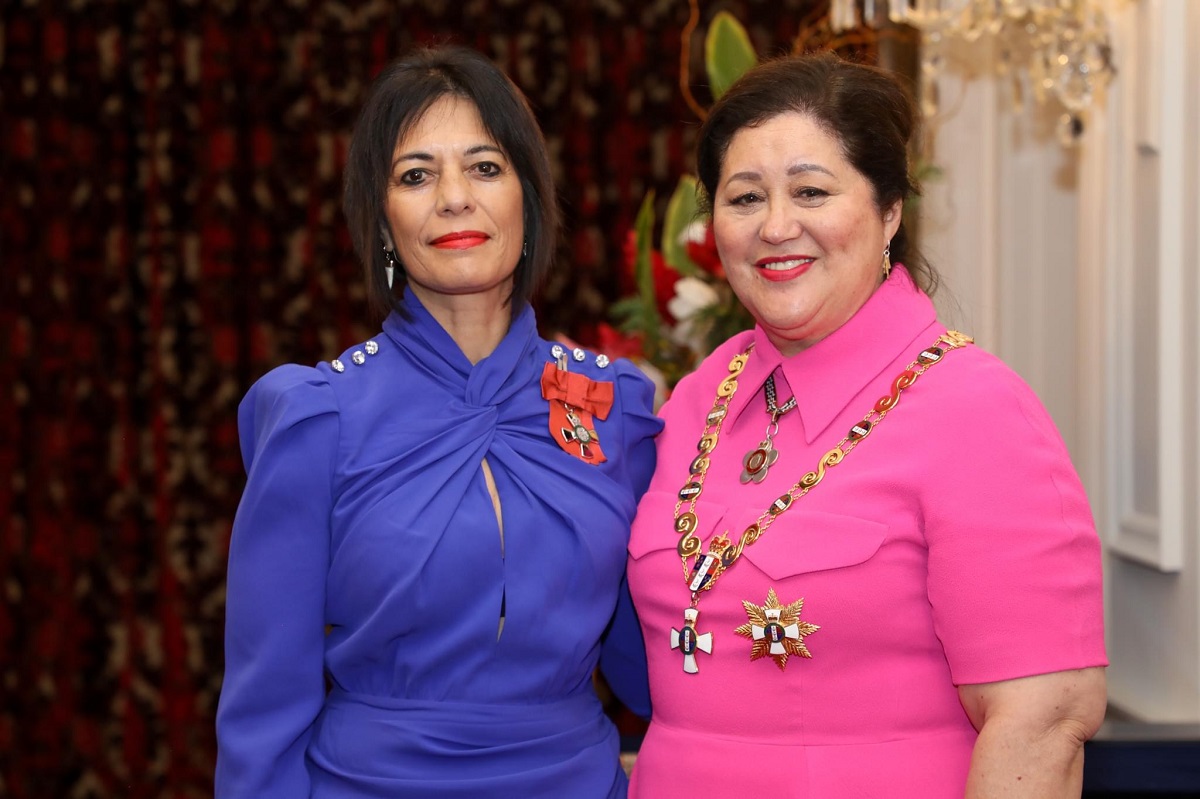
Awerangi received her New Zealand Order of Merit for services to Māori health from Governor-General Dame Cindy Kiro in September 2023.
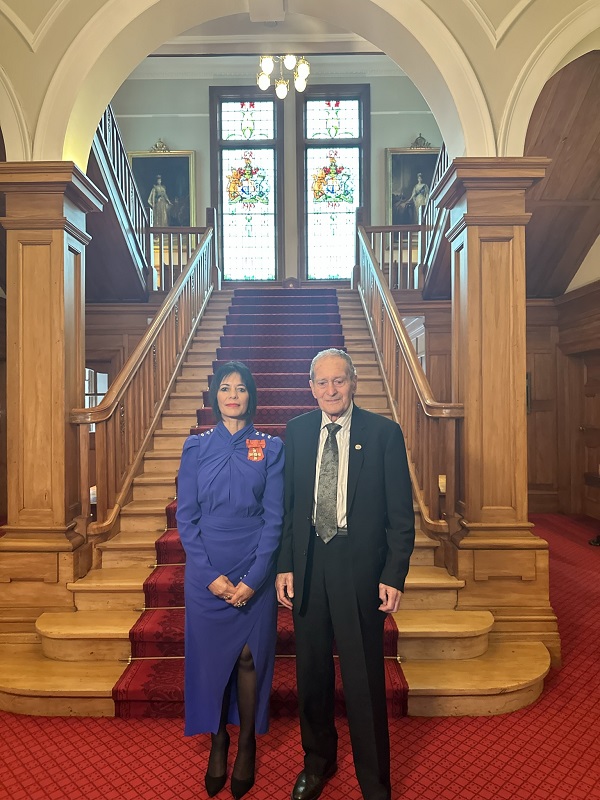
Awerangi with her father, Sir Mason Durie, when receiving the MNZM Award.
“It’s an acknowledgement of all those who have passed on and made huge contributions to progressing the health of our people; those who continue to work tirelessly in our communities advocating and supporting whānau wellbeing and serves as a reminder that the mahi I undertake now in Māori Health is yet another step in the blueprint for our next generations to continue to progress. ”
Forging a path for future generations
For the new generation of Māori leaders seeking to impact health and social equity, Awerangi offers profound advice, “Be clear as to your why for doing this and then be able to answer what has changed that has made the difference that matters most for the communities you serve.”
Awerangi’s journey is a story of dedication, inspiring leadership, and transformative action. Reflecting on her time at Massey, Awerangi often shares a lesson that resonates deeply with current students, “We are all forged from the past and wired for the future,” she says, urging them to take leaps of faith in creating conditions for whānau wellbeing, flourishing families, and strong communities.